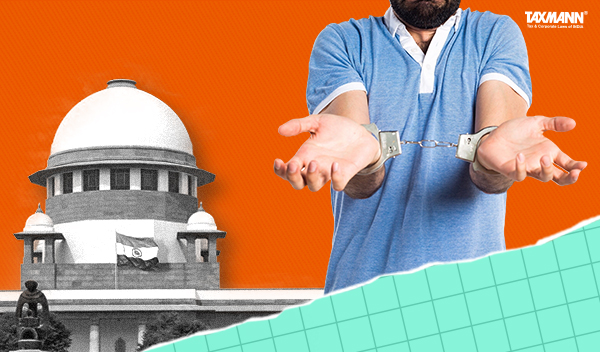Applicant’s Custody in One Case Doesn’t Bar Pre-Arrest Bail in Another Case | HC
- Blog|News|FEMA & Banking|
- 2 Min Read
- By Taxmann
- |
- Last Updated on 23 October, 2024

Case Details: Amar S. Mulchandani v. State of Maharashtra - [2024] 167 taxmann.com 495 (HC-Bombay)
Judiciary and Counsel Details
- N.J. Jamadar, J.
-
Aabad Ponda, Sr. Adv., Shantanu Phanse, Sudhanva S. Bedekar, Ms Ilsa Shaikh for the Applicant.
-
Naresh Shamnani and Ms. Minal Chandnani & Atul Bhas for the Respondent.
Facts of the Case
In the instant case, the applicant came to be arrested in connection with ECIR. While in custody, he apprehended arrest in connection with the complaint registered against him at the instance of the respondent for offences punishable under Sections 420, 406, 409, 465, 467, 468, and 471 read with Section 34 of the Indian Penal Code.
In such circumstances, he prayed for anticipatory bail before the High Court in connection with the said criminal case. The Respondent raised an objection to the maintainability of the application for pre-arrest bail on the proposition that as the applicant was already in custody in connection with ECIR, he could not pray for anticipatory bail under Section 438 of the Code of Criminal Procedure, 1973.
It was noted that the proposition is fraught with incalculable harm to personal liberty. Further, a person under arrest can be deprived of statutory remedy, thereby jeopardising his personal liberty by employing various devices.
It is quite possible that such a person can be arrested in another case the moment he is released in the first case, or there is an impending possibility of release on account of default in filing a charge sheet in the first case, or the said person can be arrested in multiple prosecutions lodged against him by seeking production warrant under Section 267 of the Code.
High Court Held
The High Court observed that the object of Section 438 of the Code of Criminal Procedure, 1973, would be frustrated if the blanket proposition is laid down that the moment a person is arrested in one case, he is debarred from seeking pre-arrest bail in another case till he secures his release on regular bail in the first case.
Further, in the case of Sunil Kallani (supra), the Supreme Court observed that the grant of anticipatory bail is essential to prevent a concerned person from litigation initiated with the object of injuring and humiliating the applicant by having him so arrested and for a person who stands already arrested, such a ground is not available.
The High Court held that the conspectus of the aforesaid discussion was that there was no reason to take a different view of the matter. Thus, the fact that the applicant was already in custody in one case did not preclude him from seeking prearrest bail in connection with another case in which he apprehended arrest. Resultantly, objection to the maintainability of an application on the said count stands disallowed.
List of Cases Reviewed
- Narinderjit (supra) (Para 40) distinguished
- Alnesh Somji (supra)(Para 44) followed
Disclaimer: The content/information published on the website is only for general information of the user and shall not be construed as legal advice. While the Taxmann has exercised reasonable efforts to ensure the veracity of information/content published, Taxmann shall be under no liability in any manner whatsoever for incorrect information, if any.

Taxmann Publications has a dedicated in-house Research & Editorial Team. This team consists of a team of Chartered Accountants, Company Secretaries, and Lawyers. This team works under the guidance and supervision of editor-in-chief Mr Rakesh Bhargava.
The Research and Editorial Team is responsible for developing reliable and accurate content for the readers. The team follows the six-sigma approach to achieve the benchmark of zero error in its publications and research platforms. The team ensures that the following publication guidelines are thoroughly followed while developing the content:
- The statutory material is obtained only from the authorized and reliable sources
- All the latest developments in the judicial and legislative fields are covered
- Prepare the analytical write-ups on current, controversial, and important issues to help the readers to understand the concept and its implications
- Every content published by Taxmann is complete, accurate and lucid
- All evidence-based statements are supported with proper reference to Section, Circular No., Notification No. or citations
- The golden rules of grammar, style and consistency are thoroughly followed
- Font and size that’s easy to read and remain consistent across all imprint and digital publications are applied



 CA | CS | CMA
CA | CS | CMA
